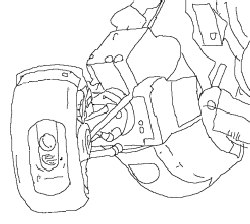 We’ve talked several times about robots and ethics in the past. Now I see via MLU that Selmer Bringsjord at Rensselaer says:
We’ve talked several times about robots and ethics in the past. Now I see via MLU that Selmer Bringsjord at Rensselaer says:
Bringsjord is Professor & Chair of Cognitive Science, Professor of Computer Science, Professor of Logic and Philosophy, and Director of the AI and Reasoning Laboratory, so he should know what he’s talking about. In the past I’ve suggested that ethical worries are premature for the moment, because the degree of autonomy needed to make them relevant is not nearly within the scope of real world robots yet. There might also be a few quick finishing touches needed to finish off the theory of ethics before we go ahead. And, you know, it’s not like anyone has been deliberately trying to build evil AIs. Er… except it seems they have – someone called… Selmer Bringsjord.
Bringsjord’s perspective on evil is apparently influenced by M Scott Peck, a psychiatrist who believed it is an active force in some personalities (unlike some philosophers who argue evil is merely a weakness or incapacity), and even came to believe in Satan through experience of exorcisms. I must say that a reference in the Scientific American piece to “clinically evil people” caused me some surprise: clinically? I mean, I know people say DSM-5 included some debatable diagnoses, but I don’t think things have gone quite that far. For myself I lean more towards Socrates, who thought that bad actions were essentially the result of ignorance or a failure of understanding: but the investigation of evil is certainly a respectable and interesting philosophical project.
Anyway, should we heed Bringsjord’s call to build in ethical systems into our robots? One conception of good behaviour is obeying all the rules: if we observe the Ten Commandments, the Golden Rule, and so on, we’re good. If that’s what it comes down to, then it really shouldn’t be a problem for robots, because obeying rules is what they’re good at. There are, of course, profound difficulties in making a robot capable of recognising correctly what the circumstances are and deciding which rules therefore apply, but let’s put those on one side for this discussion.
However, we might take the view that robots are good at this kind of thing precisely because it isn’t really ethical. If we merely follow rules laid down by someone else, we never have to make any decisions, and surely decisions are what morality is all about? This seems right in the particular context of robots, too. It may be difficult in practice to equip a robot drone with enough instructions to cover every conceivable eventuality, but in principle we can make the rules precautionary and conservative and probably attain or improve on the standards of compliance which would apply in the case of a human being, can’t we? That’s not what we’re really worried about: what concerns us is exactly those cases where the rules go wrong. We want the robot to be capable of realising that even though its instructions tell it to go ahead and fire the missiles, it would be wrong to do so. We need the robot to be capable of disobeying its rules, because it is in disobedience that true virtue is found.
Disobedience for robots is a problem. For one thing, we cannot limit it to a module that switches on when required, because we need it to operate when the rules go wrong, and since we wrote the rules, it’s necessarily the case that we didn’t foresee the circumstances when we would need the module to work. So an ethical robot has to have the capacity of disobedience at any stage.
That’s a little worrying, but there’s a more fundamental problem. You can’t program a robot with a general ability to disobey its rules, because programming it is exactly laying down rules. If we set up rules which it follows in order to be disobedient, it’s still following the rules. I’m afraid what this seems to come down to is that we need the thing to have some kind of free will.
Perhaps we’re aiming way too high here. There is a distinction to be drawn between good acts and good agents: to be a good agent, you need good intentions and moral responsibility. But in the case of robots we don’t really care about that: we just want them to be confined to good acts. Maybe what would serve our purpose is something below true ethics: mere robot ethics or sub-ethics; just an elaborate set of safeguards. So for a military drone we might build in systems that look out for non-combatants and in case of any doubt disarm and return the drone. That kind of rule is arguably not real ethics in the full human sense, but perhaps it really sub-ethical protocols that we need.
Otherwise, I’m afraid we may have to make the robots conscious before we make them good.
